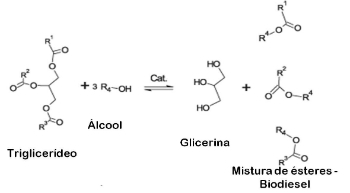Biodiesel is a liquid biofuel considered a renewable energy source, which replaces the use of fossil fuels.
It is produced from plant or animal sources. Therefore, it is a natural and biodegradable product with a low pollutant content. It represents an alternative to replace petroleum-derived fuels, which are polluting.
 Biodiesel is a less polluting fuel alternative
Biodiesel is a less polluting fuel alternative
It is used above all, in the area of transport, as fuel in cars, trucks, tractors, replacing diesel oil, one of the most polluting ones.
It is also used in the generation of heat and electricity. That's because biofuels are produced using biomass energy. Biogas and bioethanol are also examples of biofuels.
Biodiesel Production
Biodiesel consists of esters and vegetable oils, such as sunflower oil, soy, canola, castor oil, cotton, among others.
Biodiesel production is carried out by mixing vegetable oil or animal fat in methanol or ethanol, in the presence of a catalyst. This process is called transesterification.
Oils and fats consist mainly of triglycerides. Triglycerides have three long chains of
fatty acids linked to a glycerin molecule.When reacting with the alcohol (methanol or ethanol), the three fatty acid chains detach from the glycerin and give rise to a biodiesel molecule.
We can describe obtaining biodiesel through the following chemical reaction:

By the process of decant, the glycerin is separated and the biodiesel is purified and filtered.
Glycerin is therefore a by-product of the process. It is used by the cosmetics, food and pharmaceutical industries.
Also read about esterification.
Advantages and disadvantages
Benefits:
- Reduces the emission of polluting gases
- Decrease in the greenhouse effect and air pollution
- Renewable energy source, considered a form of clean energy
- Replaces the use of fossil fuels
- Increases engine life
- Ease of storage and transport
- job and income generation
- Lower costs than oil (economic alternative)
- Low explosion risk
- Not toxic or corrosive
Disadvantages
- Increased deforestation
- Increase in input costs
- Lower energy production
- More expensive than diesel
- Few filling stations
Biodiesel in Brazil
Brazil is one of the largest biodiesel producers in the world. This results in reduced pollution and also generates more jobs and income, favoring economic and social development.
In this case, it is advantageous since the country has large tracts of arable land, which can produce a huge variety of oilseeds at a low production cost.
Soy is the species cultivated in Brazil on a sufficient scale for the production and sale of biodiesel.
Petrobras is the Brazilian company that produces biodiesel. The main producing states are: São Paulo, Paraná, Mato Grosso, Mato Grosso do Sul, Goiás and Rio Grande do Sul.
Learn more about the topic, read also:
- biomass
- Biofuels
- Biogas
- Alternative energy sources
- Fossil fuels

